#literary posts
Text
even if you're not a supernatural fan, if you've been on tumblr long enough you are, like, culturally. like cultural christianity in america except it's the cw's supernatural. you may never have watched an episode or set foot inside the tag but your regular life shuts down on their holidays and all of your world news is delivered through that point of view. something to think about
#while i'm making equivalences we could look at the comparable impacts of the bible on the western literary canon and supernatural on ao3#edited to add: y'all i have never seen supernatural either that's the post#yes my brain has been rotted by this fandom but the call is coming from outside the house#that tumblr lyfe#containment breach#spn
53K notes
·
View notes
Text
Suzanne Collins straight up invented a whole marriage ceremony based around toasting bread on an open fire for your one true love just to then have THE BAKER'S SON LITERALLY BURN BREAD FOR THE GIRL ON FIRE
Absolute legend.
LEGEND.
#the hunger games#everlark#katniss everdeen#peeta mellark#THE LITERARY PARALLELS#THE SYMBOLISM#IF ONLY I COULD BE SO GLORIOUSLY INCANDESCENT#they were made for fanfic is2g#sorry not sorry for all the hg posts#this is my hyperfixation and i'm taking you all down with me#rambles
11K notes
·
View notes
Text
People are so lucky I don’t fully speak my mind.
#muse#text quotes#musings#literary quotes#lit#literature#silly text#silly post#feelings#relatable#tumblr girls#spilled ink
397 notes
·
View notes
Text

Let this be a living example that knowing the beliefs of any individual who wrote any piece of text- be it literature, articles, or posts- can and should drastically alter your perception on what the text is actually communicating, even if that knowledge has, on its face, changed none of the actual printed words. This is how application of real-world context works, and this is how it applies to any recorded medium.
It reminds me heavily of a quote from video essayist Jacob Geller, regarding the 1938 film Olympia- "It's different when Nazis do it".
Olympia is a film that, on its face, simply depicts an artistic documentation of the 1936 Berlin Olympics. But within the context of its production taking place during the Nazi regime, with its director being a well known Nazi propagandist... The way the movie fixates on the power and elegance of the human form and Ancient Greek statues quickly shifts from being completely innocuous appreciation to the worship of what is perceived as the ideal forms of the "Aryan race". Suddenly, you understand the movie not to be a pretty inoffensive documentation of a historical event, but a propaganda piece.
Understanding the time period in which something was made, as well as the setting it was produced in/for, and whatever ideologies an artist may hold and experiences they've had is absolutely critical to getting a full understanding of anyone's work. There are some things that are near completely anodyne on their face, but the revelation of what the author thinks and feels about other people and the world around them totally redefines every word on the page.
This image is such a prime example of why context matters. This opinion, laid bare, stripped of context, is both inoffensive and nonsensical. No one's ever thought it to be lame to create your own nickname... But on its own, that's a harmless kind of wrong.
... But with the addition of them being marked as Anti-Trans (red) on Shinigami Eyes, a browser extension dedicated to crowdsourcing keeping track of Trans Friendly and Transphobic creators... Suddenly, "Nicknames" doesn't mean "Nicknames" anymore. Suddenly, you realize that "Nicknames" is code for "Chosen Names of Trans People". Suddenly this isn't about thinking choosing your own nickname is lame, this is about thinking that trans people shouldn't have the right to name themselves. Suddenly it's about invalidating identities, thinking they're worth mocking. Thinking that people who identify as trans are "just trying to be cool", and that they're not actually what they say they are, because you don't get to choose your gender nickname, that's something already decided for you.
Suddenly, you realize, it's not about "being lame".
It's about Transphobic Violence.
This is why you cannot ignore when an artist, author, essayist, developer, musician- so on and so forth- is bigoted. This is why you can't ignore the context behind their upbringing. This is why you can't ignore the context behind their lived experience, their ideals, their goals, their message. Yes, it may appear innocent on its face. Yes, it may look fine stripped from the context of it being written by an inevitably flawed human being. But what's really being said here? What do those words mean... To the one who wrote them?
Context redefines Text.
Even if the words didn't change.
#this post is a bit random. not apologizing. it was just such a perfect encapsulation#i am still tagging this as homestuck because this is ultimately EXACTLY how i feel about hussie + their works. you must understand this.#its so applicable to hussie + homestuck + analysis of homestuck that it is fucking painful. PLEASE understand this. PLEASEEEE#homestuck#homestuck meta#homestuck analysis#andrew hussie#context#literary analysis#essay writing#cw nazi#cw transphobia#nekro.pdf#nekro.txt
1K notes
·
View notes
Text
The true post-cyberpunk hero is a noir forensic accountant

I'm touring my new, nationally bestselling novel The Bezzle! Catch me in TOMORROW (Apr 17) in CHICAGO, then Torino (Apr 21) Marin County (Apr 27), Winnipeg (May 2), Calgary (May 3), Vancouver (May 4), and beyond!

I was reared on cyberpunk fiction, I ended up spending 25 years at my EFF day-job working at the weird edge of tech and human rights, even as I wrote sf that tried to fuse my love of cyberpunk with my urgent, lifelong struggle over who computers do things for and who they do them to.
That makes me an official "post-cyberpunk" writer (TM). Don't take my word for it: I'm in the canon:
https://tachyonpublications.com/product/rewired-the-post-cyberpunk-anthology-2/
One of the editors of that "post-cyberpunk" anthology was John Kessel, who is, not coincidentally, the first writer to expose me to the power of literary criticism to change the way I felt about a novel, both as a writer and a reader:
https://locusmag.com/2012/05/cory-doctorow-a-prose-by-any-other-name/
It was Kessel's 2004 Foundation essay, "Creating the Innocent Killer: Ender's Game, Intention, and Morality," that helped me understand litcrit. Kessel expertly surfaces the subtext of Card's Ender's Game and connects it to Card's politics. In so doing, he completely reframed how I felt about a book I'd read several times and had considered a favorite:
https://johnjosephkessel.wixsite.com/kessel-website/creating-the-innocent-killer
This is a head-spinning experience for a reader, but it's even wilder to experience it as a writer. Thankfully, the majority of literary criticism about my work has been positive, but even then, discovering something that's clearly present in one of my novels, but which I didn't consciously include, is a (very pleasant!) mind-fuck.
A recent example: Blair Fix's review of my 2023 novel Red Team Blues which he calls "an anti-finance finance thriller":
https://economicsfromthetopdown.com/2023/05/13/red-team-blues-cory-doctorows-anti-finance-thriller/
Fix – a radical economist – perfectly captures the correspondence between my hero, the forensic accountant Martin Hench, and the heroes of noir detective novels. Namely, that a noir detective is a kind of unlicensed policeman, going to the places the cops can't go, asking the questions the cops can't ask, and thus solving the crimes the cops can't solve. What makes this noir is what happens next: the private dick realizes that these were places the cops didn't want to go, questions the cops didn't want to ask and crimes the cops didn't want to solve ("It's Chinatown, Jake").
Marty Hench – a forensic accountant who finds the money that has been disappeared through the cells in cleverly constructed spreadsheets – is an unlicensed tax inspector. He's finding the money the IRS can't find – only to be reminded, time and again, that this is money the IRS chooses not to find.
This is how the tax authorities work, after all. Anyone who followed the coverage of the big finance leaks knows that the most shocking revelation they contain is how stupid the ruses of the ultra-wealthy are. The IRS could prevent that tax-fraud, they just choose not to. Not for nothing, I call the Martin Hench books "Panama Papers fanfic."
I've read plenty of noir fiction and I'm a long-term finance-leaks obsessive, but until I read Fix's article, it never occurred to me that a forensic accountant was actually squarely within the noir tradition. Hench's perfect noir fit is either a happy accident or the result of a subconscious intuition that I didn't know I had until Fix put his finger on it.
The second Hench novel is The Bezzle. It's been out since February, and I'm still touring with it (Chicago tonight! Then Turin, Marin County, Winnipeg, Calgary, Vancouver, etc). It's paying off – the book's a national bestseller.
Writing in his newsletter, Henry Farrell connects Fix's observation to one of his own, about the nature of "hackers" and their role in cyberpunk (and post-cyberpunk) fiction:
https://www.programmablemutter.com/p/the-accountant-as-cyberpunk-hero
Farrell cites Bruce Schneier's 2023 book, A Hacker’s Mind: How the Powerful Bend Society’s Rules and How to Bend Them Back:
https://pluralistic.net/2023/02/06/trickster-makes-the-world/
Schneier, a security expert, broadens the category of "hacker" to include anyone who studies systems with an eye to finding and exploiting their defects. Under this definition, the more fearsome hackers are "working for a hedge fund, finding a loophole in financial regulations that lets her siphon extra profits out of the system." Hackers work in corporate offices, or as government lobbyists.
As Henry says, hacking isn't intrinsically countercultural ("Most of the hacking you might care about is done by boring seeming people in boring seeming clothes"). Hacking reinforces – rather than undermining power asymmetries ("The rich have far more resources to figure out how to gimmick the rules"). We are mostly not the hackers – we are the hacked.
For Henry, Marty Hench is a hacker (the rare hacker that works for the good guys), even though "he doesn’t wear mirrorshades or get wasted chatting to bartenders with Soviet military-surplus mechanical arms." He's a gun for hire, that most traditional of cyberpunk heroes, and while he doesn't stand against the system, he's not for it, either.
Henry's pinning down something I've been circling around for nearly 30 years: the idea that though "the street finds its own use for things," Wall Street and Madison Avenue are among the streets that might find those uses:
https://craphound.com/nonfic/street.html
Henry also connects Martin Hench to Marcus Yallow, the hero of my YA Little Brother series. I have tried to make this connection myself, opining that while Marcus is a character who is fighting to save an internet that he loves, Marty is living in the ashes of the internet he lost:
https://pluralistic.net/2023/05/07/dont-curb-your-enthusiasm/
But Henry's Marty-as-hacker notion surfaces a far more interesting connection between the two characters. Marcus is a vehicle for conveying the excitement and power of hacking to young readers, while Marty is a vessel for older readers who know the stark terror of being hacked, by the sadistic wolves who're coming for all of us:
https://www.youtube.com/watch?v=I44L1pzi4gk
Both Marcus and Marty are explainers, as am I. Some people say that exposition makes for bad narrative. Those people are wrong:
https://maryrobinettekowal.com/journal/my-favorite-bit/my-favorite-bit-cory-doctorow-talks-about-the-bezzle/
"Explaining" makes for great fiction. As Maria Farrell writes in her Crooked Timber review of The Bezzle, the secret sauce of some of the best novels is "information about how things work. Things like locks, rifles, security systems":
https://crookedtimber.org/2024/03/06/the-bezzle/
Where these things are integrated into the story's "reason and urgency," they become "specialist knowledge [that] cuts new paths to move through the world." Hacking, in other words.
This is a theme Paul Di Filippo picked up on in his review of The Bezzle for Locus:
https://locusmag.com/2024/04/paul-di-filippo-reviews-the-bezzle-by-cory-doctorow/
Heinlein was always known—and always came across in his writings—as The Man Who Knew How the World Worked. Doctorow delivers the same sense of putting yourself in the hands of a fellow who has peered behind Oz’s curtain. When he fills you in lucidly about some arcane bit of economics or computer tech or social media scam, you feel, first, that you understand it completely and, second, that you can trust Doctorow’s analysis and insights.
Knowledge is power, and so expository fiction that delivers news you can use is novel that makes you more powerful – powerful enough to resist the hackers who want to hack you.
Henry and I were both friends of Aaron Swartz, and the Little Brother books are closely connected to Aaron, who helped me with Homeland, the second volume, and wrote a great afterword for it (Schneier wrote an afterword for the first book). That book – and Aaron's afterword – has radicalized a gratifying number of principled technologists. I know, because I meet them when I tour, and because they send me emails. I like to think that these hackers are part of Aaron's legacy.
Henry argues that the Hench books are "purpose-designed to inspire a thousand Max Schrems – people who are probably past their teenage years, have some grounding in the relevant professions, and really want to see things change."
(Schrems is the Austrian privacy activist who, as a law student, set in motion the events that led to the passage of the EU's General Data Privacy Regulation:)
https://pluralistic.net/2020/05/15/out-here-everything-hurts/#noyb
Henry points out that William Gibson's Neuromancer doesn't mention the word "internet" – rather, Gibson coined the term cyberspace, which, as Henry says, is "more ‘capitalism’ than ‘computerized information'… If you really want to penetrate the system, you need to really grasp what money is and what it does."
Maria also wrote one of my all-time favorite reviews of Red Team Blues, also for Crooked Timber:
https://crookedtimber.org/2023/05/11/when-crypto-meant-cryptography/
In it, she compares Hench to Dickens' Bleak House, but for the modern tech world:
You put the book down feeling it’s not just a fascinating, enjoyable novel, but a document of how Silicon Valley’s very own 1% live and a teeming, energy-emitting snapshot of a critical moment on Earth.
All my life, I've written to find out what's going on in my own head. It's a remarkably effective technique. But it's only recently that I've come to appreciate that reading what other people write about my writing can reveal things that I can't see.

If you'd like an essay-formatted version of this post to read or share, here's a link to it on pluralistic.net, my surveillance-free, ad-free, tracker-free blog:
https://pluralistic.net/2024/04/17/panama-papers-fanfic/#the-1337est-h4x0rs

Image:
Frédéric Poirot (modified)
https://www.flickr.com/photos/fredarmitage/1057613629 CC BY-SA 2.0
https://creativecommons.org/licenses/by-sa/2.0/
#pluralistic#science fiction#cyberpunk#literary criticism#maria farrell#henry farrell#noir#martin hench#marty hench#red team blues#the bezzle#forensic accountants#hackers#bruce schneier#post-cyberpunk#blair fix
185 notes
·
View notes
Text
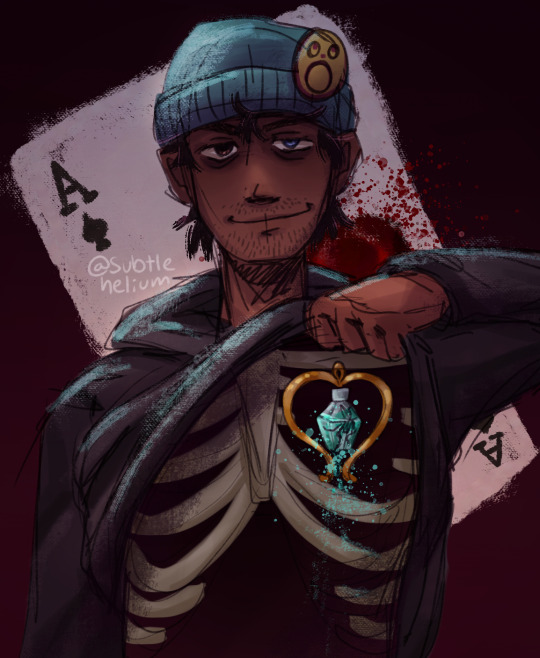
poison in his heart 🫀
#ace attorney#phoenix wright#my grand return to tumblr posting its been like 5 years#anyways. lot of thoughts in my head abt dahlia and kristoph.#i ❤️ literary parallels#my art#gore#blood
2K notes
·
View notes
Photo
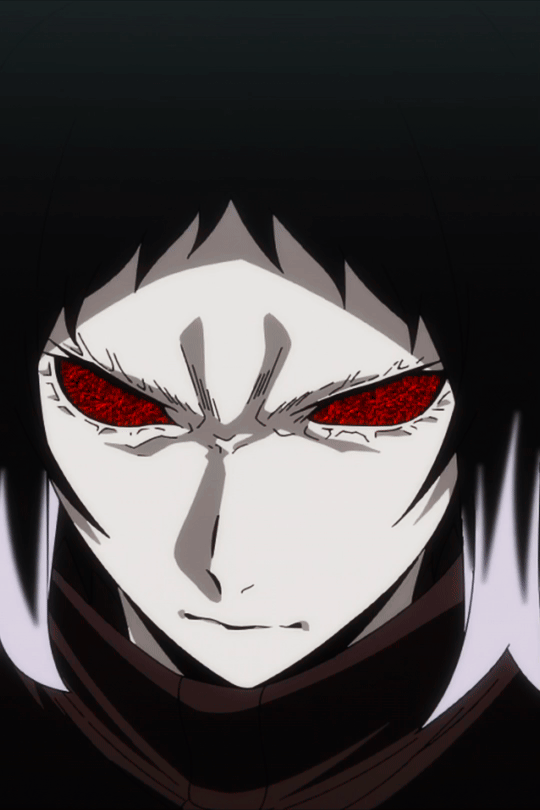

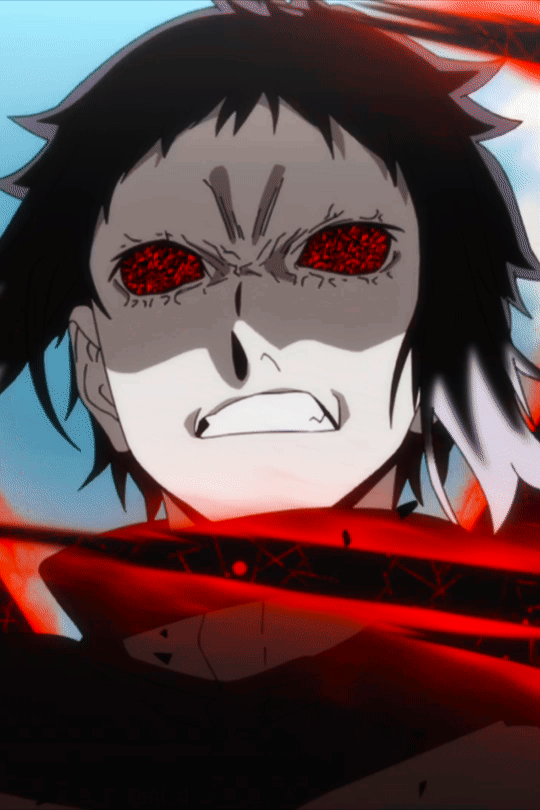
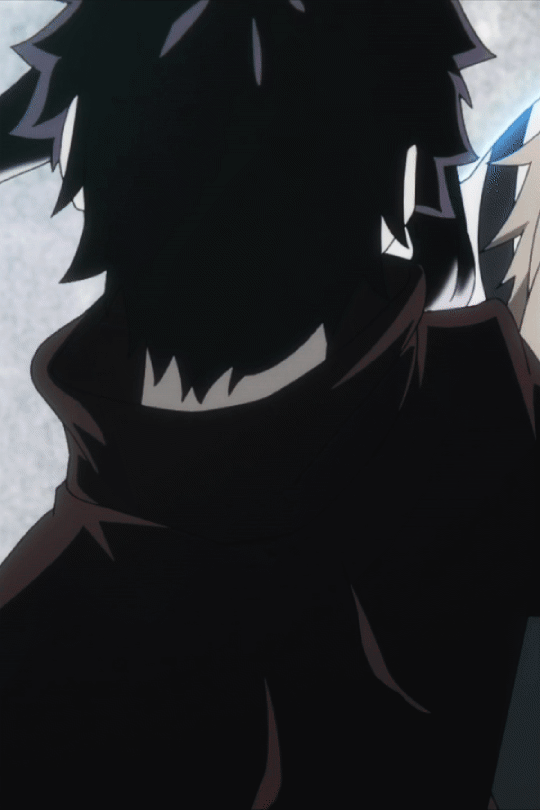
Akutagawa Ryuunosuke “Silent Rabid Dog/Diablo” (芥川 龍之介) - Bungou Stray Dogs - Episode 60
#Bungou Stray Dogs#dailybungou#fybungousd#bsdedit#bsdgraphics#Akutagawa Ryuunosuke#Ryuunosuke Akutagawa#Literary Stray Dogs#my gifs#my post
419 notes
·
View notes
Text

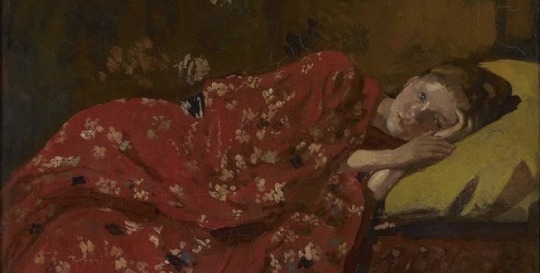




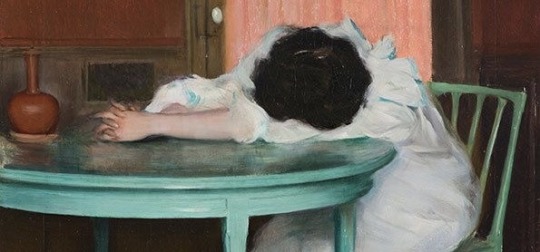

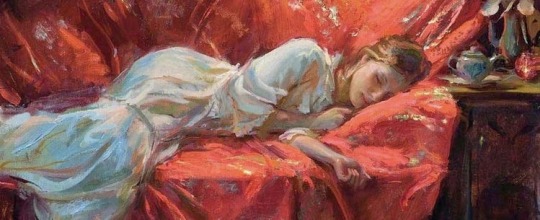

today, i can’t be. i am too tired to be.
[fatima aamer bilal, from my heart has claws // stephen ellcock // langston hughes // david hettinger // susan sontag, from the dummy // mayday parade, from i’d rather make mistakes than nothing at all //ramon casas // lana del rey, from hope is a dangerous thing for a woman like me to have — but i have it // daniel f. gerhartz // sylvia plath, from the bell jar // fatima aamer bilal, from moony moonless sky]
#web weaving#poetry#poeticstories#literature#literary#book quotations#sylvia plath#lana del rey#taylor swift#tired#painting#art#depressing post#sad thoughts#excerpts#typography#dark aesthetic#dark academia#autumn#bts#life crisis#mental illness#anxitey#mitski#moony moonless sky#franz kafka#poem#prose#emptiness#sadnees
3K notes
·
View notes
Text
I've been doing a lot of reading lately about the history of vampires in fiction and how the vampire as we know it today first entered literature, and the subject is honestly fascinating. The traditional folklore around vampires and vampire-like creatures is largely very different from what we'd think of as a vampire today, and it's also very different from how vampires appeared in even their earliest literary incarnations.
For one thing, there's nothing particularly alluring about most traditional vampires. They're bloated corpses that have crawled out of their graves, not dashing mysterious counts in lonely castles. They're not a particularly stylish or sexy monster.
However, from pretty much the moment that western literature first turned to the vampire myth for inspiration, writers saw something in the concept to sexualize. The poem "Der Vampir" (The Vampire) by Heinrich August Ossenfelder is often cited as the first ever true literary depiction of a vampire (published 1748!), and it is about a man corrupting a chaste and religious woman through his unwanted kiss/vampiric bite. John William Polidori's 1819 short story "The Vampyre" is widely seen as the first work to truly codify vampire fiction, and the titular Vampyre Ruthven is in large part inspired by the womanizing Lord Byron. Le Fanu's Carmilla depicts an intense attraction between Carmilla and her victim Laura. Stoker's Count Dracula is a man with overly flushed lips and hair on his palms, marks of Victorian fears of sexuality.
From the very start, vampires in literature have been a sexual monster. They're emblems of the seductive and terrible—the kiss of death that you can't help but be drawn to anyway. A violent forced intimacy that will corrupt you and drain away your very life force. There's a great deal of xenophobia and fear of the un-christian in early vampire fiction as well, but the fear of sex and sexual assault have always been a driver of literary vampires' horror and allure. Writers seem eternally split between desire for the vampire and revulsion at that very lust, even from the moments that the creatures first graced the page.
There's a great tradition of vampiric fiction both using vampirism to evoke sexual predators and making vampires themselves desirably sexy. Thus, given that it is very concerned with sexual assault and bodily autonomy as themes, often uses predation by a vampire to evoke sexual violence, and is deeply horny about vampires and blood drinking, Jun Mochizuki's The Case Study of Vanitas is actually one of if not the best modern successor to the canon of early vampire literature. In this essay, I will
#rare vnc post on main bc starting off with my obvious vnc icon and url would spoil the punchline#wanna take y'all by surprise a little ;P#anyway this post is a joke but the point I'm making genuinely kinda isn't#you know how it is#I am genuinely fascinated by the ways that vnc is in conversation with the literary sources that it pulls from#it really is riffing on a LOT of the same ideas through a modern lens#vnc#vanitas no carte#the case study of vanitas#invasion of the frogs
440 notes
·
View notes
Text
With the rise of booktok/booktwt, there's been this weird movement against literary criticism. It's a bizarre phenomenon, but this uptick in condemnation of criticism is so stifling. I understand that with the rise of these platforms, many people are being reintroduced into the habit of reading, which is why at the base level, I understand why many 'popular' books on booktok tend to be cozier.
The argument always falls into the 'this book means too much to me' or 'let people enjoy things,' which is rhetoric I understand -- at least fundamentally. But reading and writing have always been conduits for criticism, healthy natural criticism. We grow as writers and readers because of criticism. It's just so frustrating to see arguments like "how could you not like this character they've been the x trauma," or "why read this book if you're not going to come out liking it," and it's like...why not. That has always been the point of reading. Having a character go through copious amounts of trauma does not always translate to a character that's well-crafted. Good worldbuilding doesn't always translate to having a good story, or having beautiful prose doesn't always translate into a good plot.
There is just so much that goes into writing a story other than being able to formulate tropable (is that a word lol) characters. Good ideas don't always translate into good stories. And engaging critically with the text you read is how we figure that out, how we make sure authors are giving us a good craft. Writing is a form of entertainment too, and just like we'd do a poorly crafted show, we should always be questioning the things we read, even if we enjoy those things.
It's just werd to see people argue that we shouldn't read literature unless we know for certain we are going to like it. Or seeing people not be able to stand honest criticism of the world they've fallen in love with. I love ASOIAF -- but boy oh boy are there a lot of problems in the story: racial undertones, questionable writing decisions, weird ness overall. I also think engaging critically helps us understand how an author's biases can inform what they write. Like, HP Lovecraft wrote eerie stories, he was also a raging racist. But we can argue that his fear of PoC, his antisemitism, and all of his weird fears informed a lot of what he was writing. His writing is so eerie because a lot of that fear comes from very real, nasty places. It's not to say we have to censor his works, but he influences a lot of horror today and those fears, that racial undertone, it is still very prevalent in horror movies today. That fear of the 'unknown,'
Gone with the Wind is an incredibly racist book. It's also a well-written book. I think a lot of people also like confine criticism to just a syntax/prose/technical level -- when in reality criticism should also be applied on an ideological level. Books that are well-written, well-plotted, etc., are also -- and should also -- be up for criticism. A book can be very well-written and also propagate harmful ideologies. I often read books that I know that (on an ideological level), I might not agree with. We can learn a lot from the books we read, even the ones we hate.
I just feel like we're getting to the point where people are just telling people to 'shut up and read' and making spaces for conversation a uniform experience. I don't want to be in a space where everyone agrees with the same point. Either people won't accept criticism of their favorite book, or they think criticism shouldn't be applied to books they think are well written. Reading invokes natural criticism -- so does writing. That's literally what writing is; asking questions, interrogating the world around you. It's why we have literary devices, techniques, and elements. It's never just taking the words being printed at face value.
You can identify with a character's trauma and still understand that their badly written. You can read a story, hate everything about it, and still like a character. As I stated a while back, I'm reading Fourth Wing; the book is terrible, but I like the main character. The worldbuilding is also terrible, but the author writes her PoC characters with respect. It's not hard to acknowledge one thing about the text, and still find enough to enjoy the book. And authors grow when we're honest about what worked and what didn't work. Shadow and Bone was very formulaic and derivative at points, but Six of Crows is much more inventive and inclusive. Veronica Roth's Carve the Mark had some weird racial problems, but Chosen Ones was a much better book in terms of representation. Percy Jackson is the same way. These writers grow, not just by virtue of time, but because they were critiqued and listened to that critique. C.S. Lewis and Tolkien always publically criticized each other's work. Zora Neale Hurston and Langston Hughes had a legendary friendship and back and forth with one another's works which provides so much insight into the conversations black authors and creatives were having.
Writing has always been about asking questions; prodding here and there, critiquing. It has always been a conversation, a dialogue. I urge people to love what they read, and read what they love, but always ask questions, always understand different perspectives, and always keep your mind open. Please stop stifling and controlling the conversations about your favorite literature, and please understand that everyone will not come out with the same reading experience as you. It doesn't make their experience any less valid than yours.
#long post#literary critique#literary criticism#booktok#books & libraries#booktwitter#but yeah it’s really hard for me to embrace booktube#and BookTok when the conversations that are most prevalent#are the ones telling people to not be critical of what they’re reading#esp the ones who desparately don’t want to understand differing opinions#‘how could you not like this’ or ‘how could you hate this character’#easily#because I can#a traumatic backstory isn’t gonna erase a bad story#it isn’t going to make a character or book compelling#more trauma doesn’t make the story more complex#see: with fourth wing.#thank you for reading this long rant#congrats if you make it to the tags💀😭
1K notes
·
View notes
Text
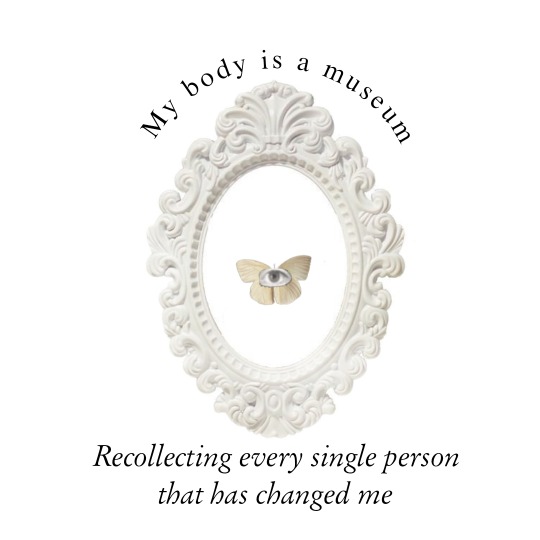
- curator 🗝️
#my post#original poem#poetry#poets on tumblr#wordsnquotes#writers and poets#albert camus#literature#prose#quotes#web weaving#my writing#my words#writers on tumblr#writeblr#writing#poetic#poem#literary quotes
178 notes
·
View notes
Text
nvm this is still on my brain. kim does not like to watch harry suffer… to say that kim takes satisfaction in harry’s pain is a huge misconstruing of his character.
the “getting thrashed like a schoolboy” line comes from a board game, lol. it’s a tease, not a cruelty. there’s never any line that implies that Kim enjoys seeing Harry taking actual morale damage.
he can be amused if you fail a check, but the check is always relatively inconsequential, and again, Harry isn’t taking damage in these.
Failing to pry the trash bin open:

Failing to shatter Ruby’s lorry window:

(also in both of these examples he only responds smugly if you choose for Harry to stubbornly dig in his heels. if Harry gets huffy, Kim teases. If Harry backs down right away Kim won’t rub it in, which feels significant to me! it reminds me of that recent post goin around about Kim meeting your energy!)
and here’s some reactions to failed checks where he does take damage.
Failing the jump to get your cloak:

Failing to break down Plaisance’s door:

he’s not laughing if Harry’s taking damage because he’s not a dick lol.
aaaaand here’s some other instances of morale/health damage and kim’s reactions.
alternate dialogue for failing the harbor jump:
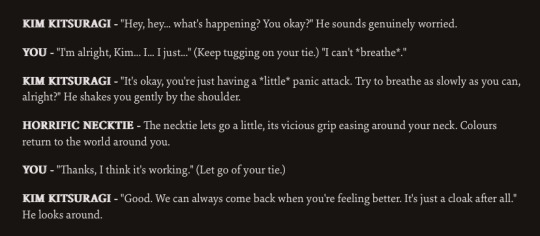
after the call with precinct 41:

seeing bullet holes in the wall:
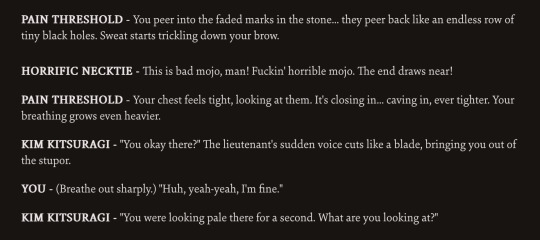
most significant examples to argue this point for me come when harry has done something to jeopardize the RCM’s image. which kim goes on and on about the importance of maintaining— and yet even here, he still extends worry and assurance.
telling Billie about her husband and handling it badly:
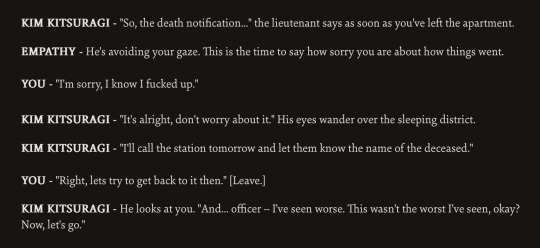
hardie authority check failure cock carousel:
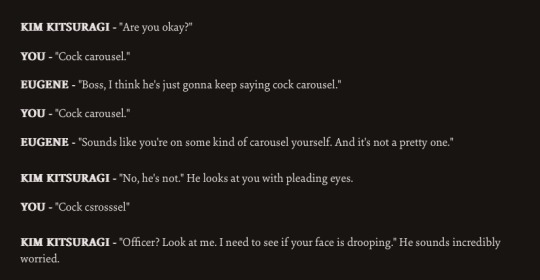
aaaaand the car. this line is one of the most mask-off kim moments we get in the game in my opinion, honestly.

tying this back to the schoolboy line— that line doesn’t show up if you have a negative reputation with Kim. if you have <1 rep, it gets replaced with him calling it “about four hours of our lives that we'll never get back,” lol.
it’s affectionate ribbing!! twisting it into anything else is bizarre 2 me lmao!
anyways. kim is a foil to every other cop we meet in the game specifically because he doesn’t view harry as a punching bag or a lost cause. gottlieb does nothing but sling jabs and glib jokes about harry’s health. torson+mclaine and the others laugh at harry’s panic attack over the radio. in response to harry’s suicide-by-car attempt(!!!!) jean yells about RCM budget. all kim’s lines in response to harry’s check failures and health-damage are consistent, explicit textual contrast against the callousness of the rest of the RCM. twisting kim’s character here requires a bad faith interpretation of the whole game.
#disco elysium#kim kitsuragi#sometimes i think that fandom Hot Takes get posted just for the sake of contrasting with the majority interpretation of the media#which can be fun lol. i personally love being a pretentious contrarian when the shoe fits.#keyword when the shoe fits#sometimes it just comes off as#the thing where positive interpretations of the thing are somehow seen as lesser or naive#which i feel is so antithetical to DE’s core philosophy#it’s not naive to interpret a hopeful story as hopeful#it’s not naive to interpret a kind character as indeed kind#kindness has as much literary value as cruelty in storytelling#overcorrecting for the sake of overcorrecting in this case just feels very. meanspirited#i don’t want to come off as antagonizing because we are all just posting about a video game on tumblr dot com at the end of the day#it’s okay to Have Differing Opinions On Media#but like. there’s a reason the post Did Not Resonate lol#oh also if anyone has a link to the other post i referenced i’d love to link it in the post properly i just couldn’t find it </3#me talking
829 notes
·
View notes
Text
I’ll be fine, I just gotta stress about it for a while.
#muse#text quotes#musings#literary quotes#lit#literature#silly text#silly post#feelings#relatable#tumblr girls
168 notes
·
View notes
Text
Honestly the pipeline of “reading the-modern-typewriter snippets at midnight on the floor of my bathroom at age eleven so I wouldn’t get caught” to “being a tumblr writer myself” is a wild one.
#queer writers#writer things#writer thoughts#that’s crazy#also I love the modern typewriter#the god key#perfection#like I ordered It immediately#and made it a fake cover so I wouldn’t get fingerprints on the paperback#I would annotate it but I couldn’t bear to deface it#it has a place of honor in my home#like an altar#you guys don’t understand I scrolled through every single snippet she had posted to such an extent that I hit the end of her blog#like I got to her first post#because I wanted to read everything she had ever written#because I was like this is a god#still my idol#when internships (cause they’re writing internships) as me who my literary influences are#I always mention her#oh my god that’s my I sound British sometimes#😭#because she says things like love and darling and stuff bc she’s British and it’s an engrained part of me#not that saying love is inherently British but in the context#just know I’m saying it with an accent#not when it’s the siren tho then that’s just like#sexy#if sexy had a tone#idk I’m demisexual#Christ this is a lot of tags#to whomever takes the time to read these ily
581 notes
·
View notes
Text
jon, sansa, and “my half brother”
i’ve noticed that this particular jon quote is something of a rorschach test wherein your reading of the line is colored by your view of sansa:
He missed the girls too, even Sansa, who never called him anything but “my half brother” since she was old enough to understand what bastard meant. – AGOT, Jon III
those who assume the worst of sansa read this as “once sansa learned i was a bastard, she changed how she referred to me in order to constantly remind me of my inferior status.” a slightly more charitable reading would be something more like, “once sansa learned i was a bastard, she stopped seeing me as equal to her other brothers.” both assume that sansa originally called jon “brother” and changed to “half brother” once she learned he was a bastard.
those who are more inclined to a favorable view of sansa, though, might instead read it as “once sansa learned what the word bastard meant, she chose to call me something else.” this reading assumes that a younger, more ignorant sansa called jon a bastard without understanding what she was saying--but changed what she called jon to “half brother” once she did understand.
i tend to believe the second reading is the correct one because it better fits both the context of the quote and the evidence presented by sansa’s own words and actions throughout the series. in terms of evidence, we never witness her calling jon a bastard to his face, whether in her memories, his or anyone else’s--and we do witness her conscious care for courtesy and kindness toward those she interacts with no matter what she thinks of them inwardly. as for the context of the quote, jon thinks this about sansa in the midst of a chapter where people at the wall are repeatedly calling him bastard derisively, as well as the mocking “lord snow.” but the section where the line about sansa appears is a section where he is thinking nostalgically about his siblings back at winterfell. it makes sense that he is missing sansa’s courtesy of not calling him bastard to his face right at that moment.
but i noticed that the pre-released alayne chapter from twow actually subtly gives us sansa’s perspective on the above agot jon quote.
in the chapter, she meets harry hardyng for the first time, and the very first thing he does is call her “littlefinger’s bastard”:
“If it please you, I will show you to your chambers myself.” This time her eyes met Harry’s. She smiled just for him, and said a silent prayer to the Maiden. Please, he doesn’t need to love me, just make him like me, just a little, that would be enough for now.
Ser Harrold looked down at her coldly. “Why should it please me to be escorted anywhere by Littlefinger’s bastard?”
All three Waynwoods looked at him askance. “You are a guest here, Harry,” Lady Anya reminded him, in a frosty voice. “See that you remember that.”
sansa blushes in embarrassment and has to work hard to hold back her tears. she finds his treatment of her hurtful. but why? because a boy she wanted to like her was mean to her?
well, fortunately for us, sansa herself tells us what is most upsetting her about the interaction, later when she is able to discuss it in private with littlefinger:
“And how was your first meeting with Harry the Heir?”
“He’s horrible.”
“The world is full of horrors, sweet. By now you ought to know that. You’ve seen enough of them.”
“Yes,” she said, “but why must he be so cruel? He called me your bastard. Right in the yard, in front of everyone.”
sansa isn’t upset merely because harry was mean to her. what she is fixated on the most is the cruelty of his calling her bastard to her face in public. she is shocked that someone would be so callously cruel. keep in mind that this is a post-KL arc sansa who, as littlefinger helpfully points out in the same scene, has already experienced many of the world’s horrors. and yet, harry’s behavior here still shocks her.
jon tells us that at a young age, sansa learned what people meant when they called him a bastard, and that changed how she spoke to him. thirteen-year-old sansa tells us she thinks it’s shockingly cruel for a nobleman like harry to publicly call a bastard a bastard. with these two facts in mind, what sense does it make to conclude that younger sansa was going around intentionally reminding jon of his bastard status through her choice of language?
once again, someone inclined to assume the worst of sansa might choose to read her response in the twow chapter as “she can dish it out, but she can’t take it” and see it as her finally learning how her treatment made jon feel. however, in jon’s quote above, he explicitly says that she “never called him anything but ‘my half-brother.’”
in other words, jon himself tells us that he never heard her call him “bastard,” at least not once she had learned what the word meant. in other words, even if you are assuming the worst of sansa, based on jon’s own testimony, her treatment of him (always calling him “my half-brother”) was better than harry’s treatment of her in the twow scene (calling her a bastard to her face in public). it is also, importantly, better than the treatment jon is receiving from many of his “brothers” at the wall in the scene his quote comes from him.
if we interpret sansa’s decision to call jon “half-brother” through the lens of her twow alayne chapter, i believe it becomes abundantly clear that in the jon scene, he is reminiscing nostalgically about sansa’s kindness in choosing not to call him a bastard. sansa’s choice of “half-brother” was a reflection of her understanding that calling him bastard was shockingly cruel behavior.
#asoiaf#sansa stark#just a little literary analysis#perhaps someone else has already pointed this out and i've missed it#if so please let me know so that i can link your post!
531 notes
·
View notes
Text
"this character in iwtv isn't a victim-" but YES they ARE!!!
literally everyone in this entire series is victimized, at some point, by something! that's half the point! like whether it is a system or society or individual or circumstance!
your problem is just that you're conflating victimhood with innocence, with being morally right, with being the "good" one. and your problem there is that no one in this series is innocent
#emil.txt#iwtv#interview with the vampire#don't be a clown on this post please i beg you#think for a moment#put on ur literary analysis hat plz and thank u!#don't come on this post telling me denis is innocent or a victim either we ALL saw him drive that carriage without a license in the movie
147 notes
·
View notes